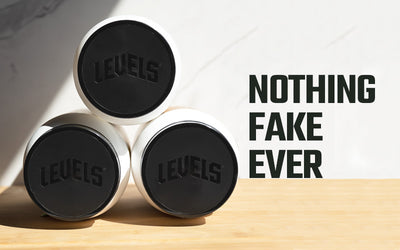Just like adults, young people need to eat enough healthy food to meet their daily nutrition needs.
And protein is a vital part of nutrition, especially for the proper growth and development of children[*].
But the use of protein shakes for kids is a controversial topic. Over a third of teenagers use protein supplements, yet many pediatricians are concerned about youth supplement use[*].
Is the worry valid, or is it alarmism? And at what age can a child have protein shakes safely?
We’ve dug deep into the evidence to bring you balanced, research-based answers to your questions about childhood protein intake and safety.
Keep reading to learn the facts about protein supplements for babies, toddlers, children, pre-teens, and teenagers.
Is Protein Powder Safe for Kids?
The safety of protein powder for kids depends on several factors.
These factors include your child’s age, the type of protein, and the total amount of protein in his or her daily diet.
We’ll cover the pros and cons of protein supplementation in a moment, but here’s what to keep in mind for each age group:
- Infants (0-12 months): There’s no evidence that protein powder is harmful for infants, but there’s unlikely to be any benefit unless a child is malnourished[*][*]. Breast milk or infant formula offer complete nutrition for this age group.
- Toddlers and young children (1-3 years): After weaning off breast milk, high-quality solid food is the best choice for nutrition for very young children[*]. Unless your doctor recommends protein supplements for a medical reason, stick with healthy, whole foods.
- Children (4-8 years): Most young children can still get enough protein from whole foods, even if they’re very active[*]. However, picky eaters or underweight children may do well with occasional protein smoothies with other ingredients included (such as fruit, oats, and healthy fats).
- Pre-teens and teens (9-18 years): Kids aged 9-18 should still focus mainly on whole foods for nutrition. But athletes and physically active pre-teens and teens may benefit from protein supplementation, especially after exercise[*].
In a nutshell, high-quality protein powder is relatively safe for kids, but it’s not always a good idea.
As you can see, there’s little point in protein supplements for babies and younger kids.
Even though the risk may be low, there’s virtually no advantage to including protein powder in very young childrens’ diets, so you may as well skip it.
The potential for benefits increases the older kids get, especially if they’re physically active, underweight, or picky eaters.

If kids eat too much or too little protein, there may be problems, but the actual protein source isn’t usually the issue[*][*].
However, make sure you select a high-quality protein that’s quality-tested to be contaminant-free.
And stay away from soy protein, which is linked to possible menstrual issues and puberty changes in kids[*].
How Much Protein Do Kids Need?
Relatively speaking, kids actually need more protein than adults.
Because they’re growing and developing, childrens’ protein needs are around 20-60% higher compared to adults[*].
But because they don’t weigh as much as adults, getting enough protein normally isn’t difficult.
Except among people living in extreme poverty, protein deficiency in kids appears to be rare[*].
Here’s the United States Recommended Daily Allowance (RDA) for minimum protein intake, in grams per kilogram and per pound of bodyweight by age group[*]:
- Infants (0–12 months): 0.68 g/lb
- Young children (1–3 years): 0.5 g/lb
- Children (4–13 years): 0.43 g/lb
- Adolescents (14–18 years): 0.39 g/lb
And here’s another breakdown of minimum daily protein intake by age group from the 2015-2020 United States Dietary Guidelines recommendations[*]:
- Age 1-3: 13g per day
- Age 4-8: 19g per day
- Age 9-13: 34g per day
- Girls age 14-18: 46g per day
- Boys age 14-18: 52g per day
However, remember that these guidelines are minimums designed to prevent serious health problems in children — not maximums or limits.
And similar to adults, physical activity in kids could significantly increase protein requirements[*].
According to a 2015 paper in the Journal of Sports Medicine, young athletes may perform better when eating 1.2-1.8 grams of protein per kilogram (0.55 to 0.82 grams per pound) of bodyweight daily[*].
Next, we’ll examine both sides of a controversial question: are protein supplements for children a good idea?
The Arguments Against Protein Powder for Kids
There are two main reasons people argue against protein supplements for kids.
The first reason relates to concerns over the safety of protein powder itself.
As we already covered, though, high-quality, contaminant-free protein powder appears to be very safe when taken as directed. There’s no evidence that it’s any more dangerous for kids compared to protein from any other source.

Secondly, some people express concerns that kids will consume too much protein if they use protein supplements.
Dr. Michele LaBotz, a sports medicine doctor and lead author of a 2016 paper on performance-enhancing substances published in Pediatrics, the official journal of the American Academy of Pediatrics, has publicly expressed concern that excess calories from protein could lead to fat gain in children[*].
However, overall calorie intake is the primary problem behind fat gain — not protein intake.
A 2018 randomized controlled trial examined the effects of high protein intake in overweight children aged 6-11[*]. After 10 weeks of high-protein protein diet (25% of calories from protein) compared to low-protein diet (15% of calories from protein), there was neither a positive or negative difference in body weight or other health markers.
And evidence suggests that in adults, eating more protein reduces appetite and increases fat-burning[*]. There’s not enough data to say whether that’s also the case for kids, but it’s possible.

Some evidence also suggests that high protein intake early in life could increase the risk of being overweight or obese later in life[*][*].
But controlling for other factors in observational or epidemiological studies is difficult, and the evidence is inconclusive and mixed[*][*].
Other research has found that high protein intake early in life leads to greater height and more lean body mass later on, which are hardly disadvantages for young people[*][*].
A more realistic concern is that kids who consume large amounts of protein powder could be missing out on healthy whole foods.
At this point, it’s safe to say that there’s no big cause for concern about protein shakes in kids, but also that ultra-high protein intakes aren’t wise for children. This is true whether the protein comes from protein supplements or other sources.
As a 2016 study from the American Journal of Clinical Nutrition concluded, “[protein] intakes far above requirements have no known benefit but carry a possible risk” for children.
Coming up, we’ll examine the case in favor of sensible protein supplement use for kids.
The Case for Protein Powder for Kids
Hopefully, by now you realize that protein intake and the use of protein supplements aren’t one-size-fits-all issues for kids (or adults).
But as long as your child eats a well-rounded diet, doesn’t consume excessive amounts of protein or calories, and doesn’t have a medical condition, protein shakes are unlikely to be harmful.

And as we’ve already discussed, meal replacement protein shakes can help children who are underweight or picky eaters.
Here are some more potential benefits of protein supplements for healthy young people, ages 9-18:
- Post-workout recovery shakes with 0.32g/kg protein can increase protein synthesis for 24 hours after exercise (which could help build muscle and aid recovery), according to a 2019 study in 11-year-olds[*].
- Vegan or vegetarian children, especially athletes, could benefit from protein supplements if they aren’t obtaining adequate protein in their diets[*].
- Convenience: Like adults, active kids on the go may opt for protein smoothies out of convenience. As long as they maintain balanced diets with plenty of healthy, whole foods, there’s no harm in the occasional protein shake.
The 2019 recovery shake study mentioned above used 0.32 grams of milk protein per kilogram of body weight, which averaged to about 12.5 grams protein in a shake for the 11-year-old participants[*].
There’s no downside to using more protein post-workout, though, and there could be additional benefit.

A 2015 Journal of Sports Medicine paper on nutrition for young athletes suggests 20 grams of high-quality protein (from a shake or other sources) post-workout, plus 1-1.5 grams of carbs per kilogram of body mass within 30 minutes of training[*]
For kids using protein shakes as a meal replacement, we recommend blending in healthy foods like fruit, oats, and olive oil or coconut oil to round out the nutritional value.
Lastly, keep in mind that beyond shakes, high-protein recipes using protein powder are healthy and convenient for children as well as adults.
Conclusion
Most kids do not require protein supplements to be healthy or to obtain enough protein in their diets.
Conversely, there’s no evidence that protein shakes are unsafe for kids of any age.
And there are plenty of situations where young people may benefit from shakes. Vegans, vegetarians, picky eaters, underweight children, and athletes all stand to gain from extra protein or post-workout smoothies.
That said, there’s little or no reason for healthy babies or toddlers to consume them.
As with adults, it’s essential to keep supplements for children in perspective.
For best results, overall nutrition, hydration, healthy whole food protein sources, training, and recovery should be the top priorities.







